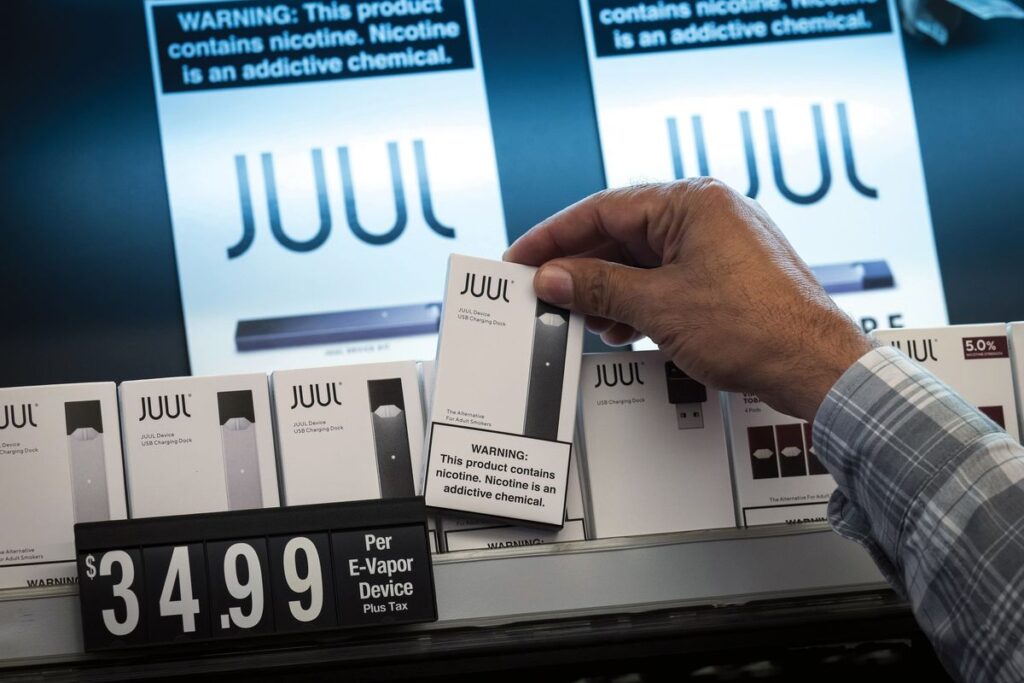JUUL Labs is a San Francisco-based e-cigarette startup that was founded in 2017. The company is known for its sleek, high-tech e-cigarette devices that use nicotine salts, which provide a smoother and more satisfying hit compared to traditional e-cigarettes.
JUUL’s founding team includes James Monsees and Adam Bowen, who were both former smokers and industrial design students at Stanford University. The idea for JUUL was born out of their frustration with traditional cigarettes and their desire to create a better alternative for smokers.
JUUL’s initial product, the JUUL e-cigarette, was launched in 2015 and quickly gained popularity among smokers looking for a more convenient and discreet way to consume nicotine. The device’s small size and USB-like shape made it easy to use and transport, while its sleek design made it a stylish accessory.
JUUL’s success has been largely driven by its focus on creating a premium, high-quality product that appeals to a broad range of consumers. The company has invested heavily in research and development to create products that are both technologically advanced and aesthetically pleasing.
JUUL’s rise to prominence has not been without controversy, however. The company has faced criticism for its marketing practices, which some have argued have targeted young people and non-smokers. In response, JUUL has taken steps to address these concerns, including suspending the sale of certain flavored products and implementing age-verification measures on its website.
Despite these challenges, JUUL remains a major player in the e-cigarette industry, with a loyal customer base and a growing presence around the world. The company’s commitment to innovation and quality has helped it stay ahead of the competition, while its focus on responsible marketing and regulation has helped it build a reputation as a responsible and ethical player in the industry.
JUUL Labs History
Juul Labs was founded by James Monsees and Adam Bowen, both former smokers and industrial design students at Stanford University. The idea for Juul was born out of their personal experiences with traditional cigarettes and their desire to create a better alternative for smokers.

In 2007, Monsees and Bowen started Ploom, a company that developed and sold a tobacco vaporizer. While Ploom gained some traction in the market, the founders realized that they could create a more effective and convenient device by using nicotine salts instead of traditional e-liquid.
After two years of research and development, Monsees and Bowen launched the Juul e-cigarette in 2015. The device quickly gained popularity among smokers who were looking for a more convenient and discreet way to consume nicotine. Juul’s sleek and stylish design, as well as its use of nicotine salts, which provide a smoother and more satisfying hit than traditional e-cigarettes, made it a hit among consumers.
The company’s success attracted the attention of investors, and in 2017, Juul Labs was spun off from Ploom and established as a separate company. The new company raised $650 million in funding from investors, including Tiger Global Management, Fidelity Investments, and Tao Capital Partners.
Since its founding, Juul Labs has continued to innovate and expand its product line, while also facing criticism for its marketing practices and the health risks associated with e-cigarettes. The company has taken steps to address these concerns, including suspending the sale of certain flavored products and implementing age-verification measures on its website.
JUUL Labs Products
Juul Labs is best known for its e-cigarette products, which are designed to deliver nicotine in a more convenient and discreet way than traditional cigarettes. The company’s flagship product is the Juul device, which is a sleek, high-tech e-cigarette that uses nicotine salts to provide a smoother and more satisfying hit.
In addition to the Juul device, Juul Labs also offers a range of flavored pods, which contain the nicotine salts and e-liquid that are used to power the device. The company has released a variety of flavors over the years, including mint, mango, cucumber, and fruit medley, among others.
In 2019, Juul Labs expanded its product lineup with the launch of the Juul C1, a Bluetooth-enabled e-cigarette that allows users to monitor their usage and set usage limits. The company also introduced a line of Juul-compatible pods under the brand name Ziip, which offers a wider range of flavors than the standard Juul pods.
While Juul Labs has primarily focused on e-cigarette products, the company has also experimented with other products and brands. In 2019, the company acquired the cannabis extraction company, Pax Labs, and launched a line of CBD-infused products under the brand name Juul Labs. However, the CBD line was short-lived and was discontinued in 2020.
JUUL Labs Owners
The company was founded in 2015 by Adam Bowen and James Monsees, who are also its current board members.
In December 2020, Juul Labs announced that it had reached a settlement with Altria Group, Inc., a major tobacco company, which had previously invested $12.8 billion in Juul Labs in 2018. As part of the settlement, Altria agreed to a partial divestiture of its Juul Labs investment and reduced the value of its remaining investment to $1.6 billion.
According to Juul Labs’ website, the company is “privately owned by global investors and venture capitalists.” Some of its major investors include Tiger Global Management, Fidelity Management & Research Company, and Tao Capital Partners. However, the exact ownership structure of Juul Labs is not publicly disclosed, as it is a private company.
Also Read: Exploring the Brand Architecture of HUL
The controversial marketing strategies of JUUL Labs
Juul Labs has been criticized for its marketing strategies, which many believe have contributed to the rise in teen vaping. Here are some of the most controversial marketing strategies employed by Juul Labs:
Youth-oriented marketing: Juul Labs’ marketing campaigns have been criticized for using bright colors, trendy social media influencers, and appealing flavors to appeal to young people. Critics say that these tactics were designed to create a youthful and trendy image for the brand and make e-cigarettes more appealing to young people.
Social media marketing: Juul Labs’ marketing campaigns have heavily utilized social media, which has been criticized for being a major factor in the rise of teen vaping. Social media platforms, like Instagram and Snapchat, are popular among young people, and critics argue that Juul Labs’ use of these platforms has contributed to the normalization of e-cigarette use among teens.
Influencer marketing: Juul Labs has used social media influencers to promote its products. These influencers have millions of followers, many of whom are young people. Critics argue that the use of social media influencers has made e-cigarettes seem more appealing and normalized their use among young people.
Misleading health claims: Juul Labs has been criticized for making misleading claims about the safety of its products. The company has claimed that its products are a safer alternative to traditional cigarettes, but health experts have expressed concern about the long-term health effects of e-cigarette use.
Distribution to minors: There have been reports of Juul Labs’ products being distributed to minors, either intentionally or unintentionally. The company has been accused of not doing enough to prevent the sale of its products to minors and failing to adequately verify the age of its customers.
Overall, Juul Labs’ marketing strategies have been controversial because of their potential to make e-cigarettes more appealing and accessible to young people. Critics argue that the company’s marketing tactics have contributed to the rise in teen vaping and the public health crisis that has followed.
Controversies Around JUUL Labs
Juul Labs has been involved in several controversies since its inception in 2015. Here are some of the most notable controversies associated with the company:
Youth marketing: Juul Labs has been accused of targeting young people with its marketing campaigns, which feature bright colors and flavors such as mango and fruit medley. The company has been criticized for creating an e-cigarette that is appealing to youth and has led to an increase in teen vaping.
Health concerns: There have been reports of serious health consequences associated with vaping, including lung damage and even death. Juul Labs has been accused of downplaying the risks associated with its products, which has led to increased concern over the safety of e-cigarettes.
Regulatory scrutiny: Juul Labs has faced regulatory scrutiny from the U.S. Food and Drug Administration (FDA) and other government agencies over its marketing practices and product safety. In 2019, the FDA issued a warning letter to Juul Labs for making unsubstantiated claims that its products are less harmful than traditional cigarettes.
Addiction concerns: There have been concerns that Juul Labs’ products are highly addictive, particularly among young people. The company has been accused of using high levels of nicotine in its e-cigarettes, which can lead to addiction and other health consequences.
Lawsuits: Juul Labs has been the subject of numerous lawsuits, including lawsuits filed by individuals who claim they were injured by using Juul products. Some of these lawsuits allege that Juul Labs’ marketing practices were deceptive and misled consumers about the risks associated with its products.
These controversies have led to increased scrutiny of Juul Labs and the e-cigarette industry as a whole.
To read more content like this, subscribe to our newsletter
Go to the full page to view and submit the form.

